PhD - Systems Engineering
Case Western Reserve University
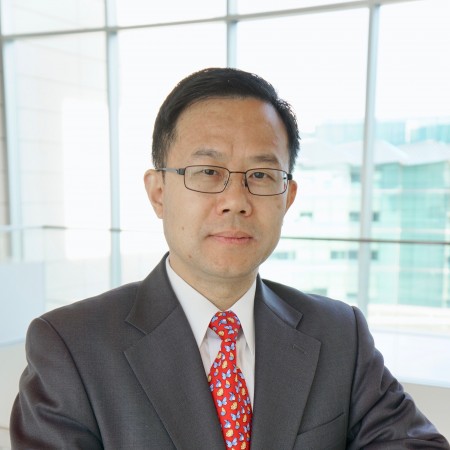
Baowei Fei
Cecil H. and Ida Green Distinguished Chair in Systems Biology Science
Professor of Bioengineering at UT Dallas and Professor of Radiology at UT Southwestern Medical Center
Director, Center for Imaging and Surgical Innovation
Prof. Fei is a national leader in biomedical imaging and image-guided interventions. He has contributed the development and translation of innovative imaging technologies to improve the detection, diagnosis, and treatment of various diseases including cancers.
Professional Preparation
MS - Computing and Information Science
Case Western Reserve University
Case Western Reserve University
Research Areas
Imaging: biomedical imaging, digital imaging
Image-guided interventions: image-guided surgery, therapy, biopsy, and drug delivery
Machine learning and artificial intelligence (AI) for biomedical imaging applications
Multimodality imaging: hyperspectral imaging, magnetic resonance imaging (MRI), positron emission tomography (PET), computed tomography (CT), and ultrasound imaging
Virtual reality, augmented reality, mixed reality for biomedical and clinical applications
Quantitative imaging: image processing & analysis, segmentation, classification, and registration
Translational imaging: cellular & molecular imaging, small animal imaging, and clinical imaging
Cancer research: prostate, head and neck, breast, pancreas, and brain
Cardiovascular diseases: heart failure
Publications
Automatic registration of CT volumes and dual-energy digital radiography for detection of cardiac and lung diseases - Conference Paper
Rotational effect on ROI's for accurate lumen quantification in bifurcated MR plaque volumes - Other
Magnetic Resonance Imaging-Based Radiomics of Axial and Sagittal Orientation in Pregnant Patients with Suspected Placenta Accreta Spectrum 2025 - Journal Article
Development and Characterization of Hemoglobin Microbubbles for Acoustic Blood Oxygen Level Dependent Imaging 2024 - Journal Article
Feature Extraction of Ultrasound Radiofrequency Data for the Classification of the Peripheral Zone of Human Prostate 2024 - Conference Paper
Dual-camera laparoscopic imaging with super-resolution reconstruction for intraoperative hyperspectral image guidance 2024 - Conference Paper
Detection and margin assessment of thyroid carcinoma with microscopic hyperspectral imaging using transformer networks 2024 - Journal Article
Awards
Faculty Research Award - Erik Jonsson School of Engineering and Computer Science, The University of Texas at Dallas [2022]
Federal Research Innovation and Expenditures Dynamo (FRIEND) Award - Office of Research and Innovation, The University of Texas at Dallas [2022]
Best Paper Award - Intuitive Surgical and SPIE Medical Imaging: Image-guided procedures, robotic interventions, and modeling [2020]
Editor’s Choice Article - Sensors, Basel, Switzerland [2020]
Fellow - American Institute for Medical and Biological Engineering (AIMBE) [2019]
Fellow - The International Society for Optics and Photonics (SPIE) [2019]
Cecil H. and Ida Green Chair in Systems Biology Science - The University of Texas at Dallas [2018]
Distinguished Investigator Award - The Academy for Radiology & Biomedical Imaging Research, Washington, DC [2013]
The Emory 1% Faculty Award - Emory University [2013]
Young Investigator Award - The Society of Nuclear Medicine and Molecular Imaging [2010]
Appointments
Director, Center for Imaging and Surgical Innovation
University of Texas at Dallas [2021–Present]
University of Texas at Dallas [2021–Present]
Cecil H. and Ida Green Distinguished Chair in Systems Biology Science
University of Texas at Dallas [2018–Present]
University of Texas at Dallas [2018–Present]
Professor of Bioengineering
University of Texas at Dallas [2018–Present]
University of Texas at Dallas [2018–Present]
Associate Professor with Tenure, Department of Radiology and Imaging Sciences
Emory University [2013–2018]
Emory University [2013–2018]
Associate Professor, Joint Department of Biomedical Engineering
Georgia Institute of Technology and Emory University [2013–2018]
Georgia Institute of Technology and Emory University [2013–2018]
Georgia Cancer Coalition Distinguished Scholar
Emory University and Georgia Institute of Technology [2009–2018]
Emory University and Georgia Institute of Technology [2009–2018]
Assistant Professor, Department of Radiology and Imaging Sciences
Emory University [2009–2013]
Emory University [2009–2013]
Assistant Professor, Joint Department of Biomedical Engineering
Georgia Institute of Technology and Emory University [2009–2013]
Georgia Institute of Technology and Emory University [2009–2013]
Assistant Professor of Biomedical Engineering and Radiology
Case Western Reserve University [2005–2008]
Case Western Reserve University [2005–2008]
News Articles
Bioengineer Building Brighter Way for Capturing Cancer During Surgery
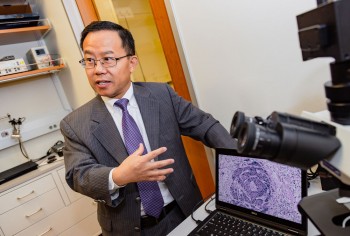 University of Texas at Dallas researchers have demonstrated that imaging technology used to map the universe shows promise for more accurately and quickly identifying cancer cells in the operating room.
University of Texas at Dallas researchers have demonstrated that imaging technology used to map the universe shows promise for more accurately and quickly identifying cancer cells in the operating room.In a study published in the Sept. 14 edition of the journal Cancers, Dr. Baowei Fei and colleagues showed that hyperspectral imaging and artificial intelligence could predict the presence of cancer cells with 80% to 90% accuracy in 293 tissue specimens from 102 head and neck cancer surgery patients.
Fei, professor of bioengineering and the Cecil H. and Ida Green Chair in Systems Biology Science in the Erik Jonsson School of Engineering and Computer Science, recently received a $1.6 million grant from the Cancer Prevention & Research Institute of Texas (CPRIT) to further develop the technology, called a smart surgical microscope.
University Will Celebrate Professors, Donors at Investiture Ceremony
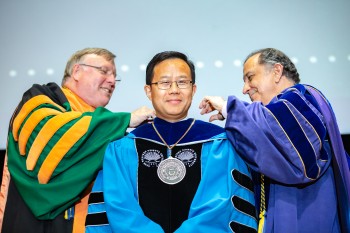
The University of Texas at Dallas will celebrate 12 of its most accomplished faculty members at an Investiture Ceremony and reception on April 29.
The ceremony also will honor the many donors who helped establish the endowed chairs and professorships that play a critical role in advancing faculty members’ instructional programs and research.
“The generosity of our donors has contributed greatly to enriching the academic environment of UT Dallas,” said President Richard C. Benson, who holds the Eugene McDermott Distinguished University Chair of Leadership. “Their investments in our institution allow us to attract and support talented faculty who impact so many through their teaching and mentoring of students, and through their research accomplishments, scholarship and creative endeavors.”
Investitures are among the oldest traditions in academia, dating back more than 500 years. During the ceremony, honorees and ceremonial participants don full academic regalia. The honorees will receive medallions symbolizing their achievements.
Dr. Baowei Fei, an imaging scientist and cancer scholar whose work has transformed medical imaging and intervention for cancer care and who teaches in the Department of Bioengineering in the Jonsson School, will be among those recognized at the ceremony.
“It is my great honor being a Cecil H. and Ida Green Chair in Systems Biology Science at UT Dallas. It is also a great honor that the title of the endowed chair is from one of UTD’s founders, Cecil Green,” Fei said. “As a biomedical engineer and imaging scientist, I am amazed by the rapid growth of the bioengineering department at UT Dallas. I am also amazed by the success of the faculty members in the department. I am proud to be part of the team.”
Fei was recruited to UT Dallas in 2018. He is also a professor in the Department of Radiology at UT Southwestern Medical Center.
The legacy of Cecil H. and Ida Green at UT Dallas was to establish in Dallas a world-class cohort of faculty and students in integrated interdisciplinary biomedical research at UT Dallas and UT Southwestern. The Cecil Green estate created the professorship.
Bioengineer Recognized Among Top in His Field with AIMBE Honor
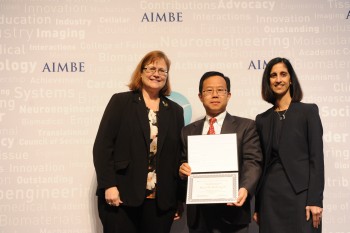
Dr. Baowei Fei, a distinguished bioengineer at The University of Texas at Dallas, has been elected to the College of Fellows of the American Institute for Medical and Biological Engineering (AIMBE), an honor that represents the top 2 percent of individuals in medical and biological engineering.
“It is my honor being part of one of Texas’ fastest growing bioengineering departments,” said Fei, the Cecil H. and Ida Green Chair in Systems Biology Science in the Department of Bioengineering. “This kind of national recognition reflects well on the entire Erik Jonsson School of Engineering and Computer Science. I am so grateful for all the support.”
Fei, who also is a professor in the Department of Radiology at UT Southwestern Medical Center, was elected for his transformative research in medical imaging and impact on cancer care. His work in quantitative imaging and image-guided intervention allows physicians to more precisely pinpoint cancer cells for earlier diagnosis and treatment, which can lead to better patient care and survival rates.
The College of Fellows comprises more than 2,000 outstanding medical and biological engineers in academia, industry and government, including engineering and medical school chairs, research directors, professors, innovators and successful entrepreneurs.
“Dr. Baowei Fei’s election as a fellow in AIMBE is driven by his distinctive and impactful research toward cancer treatment,” said Dr. Joseph J. Pancrazio, vice president for research at UT Dallas and professor of bioengineering, who was inducted as an AIMBE fellow in 2011. “The reputation of UTD’s bioengineering department has been growing substantially over the last several years, and Dr. Fei is a shining example of the clinical impact that can be achieved at the intersection of engineering, computer science and biomedicine.”
“Dr. Baowei Fei’s election as a fellow in AIMBE is driven by his distinctive and impactful research toward cancer treatment. The reputation of UTD’s bioengineering department has been growing substantially over the last several years, and Dr. Fei is a shining example of the clinical impact that can be achieved at the intersection of engineering, computer science and biomedicine.” - Dr. Joseph J. Pancrazio, vice president for research at UT Dallas
Fei’s work benefits medicine specifically in the areas of cancers of the prostate, head and neck, and heart disease. His group developed a technology system called molecular imaging directed, 3D ultrasound-guided biopsy, which improved upon 2D systems by allowing for earlier detection of potentially cancerous cells in the prostate. The technology is compatible with Fei’s larger goal: to support personalized precision medicine and customization of health care to the individual patient.
“Precision medicine is the tailoring of medical treatment to the individual characteristics of each patient. The approach relies on our understanding of how a person’s unique molecular and genetic profile makes them susceptible to certain diseases,” Fei said.
Imaging technology is considered a leading advancement in personalized medicine.
“By quantifying the size and activity of cellular, molecular and metabolic happenings, we can better distinguish tissue that is normal from malignancy in an accurate, precise and consistent manner. With new imaging technology, we can then detect cancer early, before the disease progresses. It can also improve quality of life, lower health care costs and save lives,” he said.
Dr. Poras T. Balsara, interim dean of the Jonsson School, said Fei’s reputation for collegiality matches his research prowess.
“His courteousness and humility in his daily interactions and eagerness to mentor junior faculty members and students will enable him to find success and stand out even in the most competitive environments,” Balsara said.
Fei was formally inducted during a ceremony at AIMBE’s annual meeting in March in Washington, D.C. He joined UT Dallas in April 2018.
NBC News - Dallas Researcher Finds Cancer Earlier With New Imaging Technology
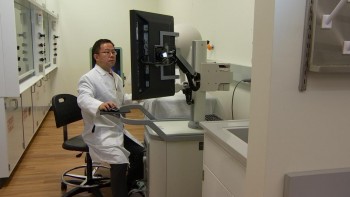
In his University of Texas at Dallas lab, Dr. Baowei Fei is able to see cancer unlike ever before.
His biomedical imaging allows doctors to more precisely pinpoint cancer cells earlier leading to better diagnosis and treatment. Ultimately, it will find cancer earlier and save lives.
"We have a conducted a clinical trial and found out that we are able to have five times higher cancer detection rates," said Fei.
It’s called molecular imaging directed, 3D ultrasound-guided biopsy, which improved upon 2D systems by allowing for earlier detection of potentially cancerous cells in the prostate.
By quantifying the size and activity of cellular, molecular and metabolic happenings, doctors can better distinguish tissue that is normal from malignancy in an accurate, precise and consistent manner.
The new imaging technology will detect cancer earlier, before the disease progresses. It can also improve quality of life, lower health care costs and save lives.
Fei's previous trial was conducted on prostate cancer patients.
"Five-year survival is almost 100 percent. If we are able to detect it earlier, we save lives.
However, if the cancer spread to other organs, the survival for prostate cancer is only 30 percent, so new imaging technology can improve cancer survival and save lives," Fei said.
World-Class Imaging Scientist, Cancer Scholar Joins University
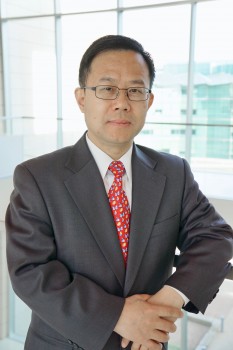
Dr. Baowei Fei, an imaging scientist and cancer scholar whose work has transformed medical imaging and intervention for cancer care, recently joined the UT Dallas Department of Bioengineering.
Fei, a professor of bioengineering, was previously an associate professor with tenure at Emory University School of Medicine and Georgia Institute of Technology (Georgia Tech). He is a leader in quantitative imaging and image-guided intervention. His work allows medical physicians to more precisely pinpoint cancer cells for earlier diagnosis and treatment, which can lead to improved patient care and survival rates.
“Dr. Fei is a world-class researcher in the area of image-guided intervention,” said Dr. Robert Rennaker, Texas Instruments Distinguished Chair in Bioengineering and head of the Department of Bioengineering in the Erik Jonsson School of Engineering and Computer Science. “Our ability to recruit faculty of his caliber is what will propel UT Dallas to national prominence as we strengthen our partnership with UT Southwestern Medical Center.
“Our goal of becoming one of the premier research institutions in the U.S. will only happen if we continue to build our medical research program,” said Rennaker, also director of the Texas Biomedical Device Center. “Dr. Fei’s leadership in this area will, no doubt, help UT Dallas reach this lofty and worthy goal.”
Fei’s career includes advanced training and experience in biomedical engineering, computer science, radiology and patient care to create quantitative bioimaging technology and devices that benefit human health, specifically in the areas of cancers of the prostate, head and neck, and heart disease.
Fei’s group developed a technology system called molecular imaging directed, 3D ultrasound-guided biopsy, which improved upon 2D systems by allowing for earlier detection of potentially cancerous cells in the prostate. This technology fits into his larger goal of supporting precision medicine – a model that customizes health care to the individual patient.
“Imaging technology is a top advance in health care over the last century and is a driving force in precision medicine,” Fei said. “By quantifying the size and activity of cellular, molecular and metabolic happenings, the better we can distinguish tissue that is normal from malignancy in an accurate, precise and consistent manner. With new imaging technology, then we can detect cellular and molecular disease early, before diseases progress to lethal stages, improving quality of life, lowering health care costs and most importantly, saving lives.”
One in nine men will be diagnosed with prostate cancer during his lifetime, according to the American Cancer Society. The current 2D ultrasound imaging technology is not always sensitive enough to pinpoint exactly where the cancer cells are in the organ. Because the prostate is made of soft, deformable tissue, this can require multiple biopsies to find the cells, costing additional time, money and stress.
From 2013-2016, Fei led the first clinical trial on positron emission tomography (PET) and ultrasound fusion targeted biopsy of the prostate. The technology first injected molecules called PET imaging tracer into the patient suspected of having prostate cancer to find the tumor. The PET images were then combined with real-time 3D ultrasound imaging to guide a biopsy needle to the lesion target. Fei presented the clinical results at the Annual Meeting of the Society of Nuclear Medicine and Molecular Imaging in 2017. His PET/ultrasound fusion targeted biopsy approach achieved a five-time higher positivity rate than the current 2D ultrasound guided biopsy, and caught the attention of outside media.
Among funding projects, Fei is currently a principal investigator of three National Institutes of Health Research Project Grants (NIH R01) with the total funding of $6.8 million. Those projects include further advancements of the imaging guided biopsy system; working with industry to more widely disseminate the imaging technology; and using imaging systems in cardiac procedures.
Other research Fei’s group is bringing to UT Dallas is investigating a technology called hyperspectral imaging for its potential use in biological and medical applications, such as real-time detection of cancer cells during surgery for complete removal of the tumor. The technology provides information about healthy and diseased tissues based on how they interact with various wavelengths of light.
After earning his bachelor’s and master’s degrees in biomedical engineering from Xi’an Jiaotong University, Fei earned his first doctoral degree from Shanghai Jiao Tong University in biomedical engineering. He then earned a master’s of science degree in computing and information science and his second doctoral degree in systems engineering from Case Western Reserve University.
He then joined the faculty of Emory University School of Medicine Department of Radiology and Imaging Science and the joint Department of Biomedical Engineering between Emory University and Georgia Tech. He was also a faculty member in the Winship Cancer Institute of Emory University, Aflac Cancer and Blood Disorders Center of the Children’s Healthcare of Atlanta, and Emory’s Department of Mathematics and Computer Science, and Georgia Tech’s Interdisciplinary Bioengineering Program.
Fei worked with clinicians and patients since his training at Case Western. At Emory University, he had research labs in both the academic facilities and in the hospitals where patients were being treated
“In our research and clinical trial at Emory University, when patients came to see the urologist for targeted biopsy of the prostate, I was able to be there with them from the beginning of their care until their end,” he said. “I would get to know the patients and sometimes their families. These experiences stoked my passion for quantitative bioimaging and image-guided intervention, because you can really see that the technology we created actually helped save lives.”
UT Dallas, the Jonsson School and specifically the Department of Bioengineering were attractive to Fei because of the fast growth of the Department and whole University; the successful working relationship with UT Southwestern Medical Center; and the many excellent students and unique opportunities within the University.
Fei was inspired by a speech by University President Richard C. Benson that Fei paraphrases: “‘We are still giving shape to this superb University, defining purpose and creating tradition that will last for 100 years and more. Put simply: you are founders,’” Fei continued. “So each of us is a founder, and I am honored to be part of this great team of the fast-growing University.
“As a biomedical engineer who has worked in clinical settings for more than a decade, I am passionate to bridge the interdisciplinary programs in order to educate our students and bring new technologies to improve human health.”